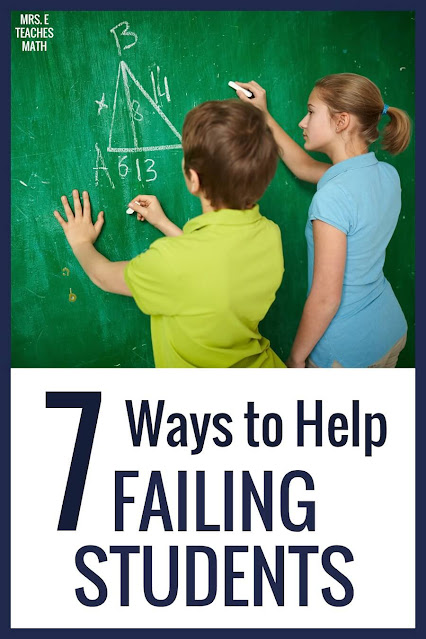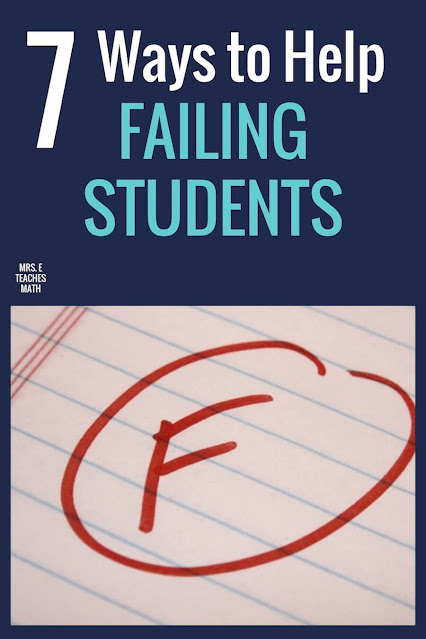You can be the best teacher in the world, but one thing is inevitable: failing students. When this happens, you're not the only one shaking your head wondering why. Students who are struggling tend to feel "stupid" or like they are not "liked", but we know this isn't true! Students are sometimes going to fail. However, there are simple things we can do to help failing students.
It is always a bit heartbreaking for me to watch students fail. I want to see all of my students succeed. The reasons students fail are plentiful: not understanding the material, lack of support or resources at home, health challenges...the list is too long! However, with support, students can improve and these tips to help failing students will make a difference.
7 Ways to Help Failing Students
1 - Get Parents Involved
One thing you can do to help a failing student is to keep the parents in the loop. Having parental support can be something wonderful as long as you know they family. While not all parents are supportive, hopefully if the parents know, the student can get help with studying at home. If students don't have a supportive home life, share with a school coach. Students tend to get more invested when there are people surrounding them with support.
2 - Allow Mistakes to Be Fixed
We all make mistakes and sometimes they are silly ones. I remember when I was in high school, I took a test and misread part of the directions. It was a long test. It was at the end of the day. I made a mistake. That mistake took my A to a C and I was devastated. Imagine how much worse that little mistake could have been if I had started with a C? I felt so dumb. However, if the teacher would have let me go back and show what I knew or fix the error I made, it could have made all the difference.
When you do allow a student to fix their mistakes, you'll want to make sure there are boundaries with that as well. For example, you'll want to have a timeline where the student can study and review if needed and then fix it. You will also want to decide how many points students are going to get back. Some teachers allow full credit while others offer half back. Either way, you can help failing students show what they actually know and ensure they are ready to move to the next step.
3 - Grow a Relationship
Often times this is the first step in helping a failing student: building a relationship. It can be really emotionally difficult for students when they are failing. So, it might be difficult for them to open up and ask for help or even accept help. You want to make sure you grow and foster that relationship before being too abrasive with a student in terms of helping them. You can also change the way you talk to the student if you haven't gotten an opportunity to form a strong relationship yet.
4 - Find the Why
No one, and I mean no one, if ever failing on purpose. Think about the last time you failed at anything. Did you want to fail? Did you feel good about failing? NO. When you look back at that moment now, you might be able to say, "Well, I failed but..." because you recognize WHY you were failing. Students often will get so wrapped up in the fact that they are failing and they don't know why.
I'm not going to lie, sometimes the why is difficult. Sometimes the why is heartbreaking. However, we can help students fix the things that are in their control and point them toward better habits.
5 - Review, Review, Review
When you find the why, you will often find out the reason students are failing might be because they are missing a basic step. Maybe they were not in school that day or something was going on in their life. No matter what the reason is, they are missing a crucial piece of information. Therefore, you need to make sure you can help them review the critical pieces of information.
Also, students may not be reviewing material enough. Sometimes the time spent in class is not enough for students. I've found many students surprised that they actually do need to study and review information to be able to remember it later!
6 - Create a Study Buddy
If you don't have a strong relationship with the student, you can also find a study buddy the student feels comfortable with. This study buddy can be another student, teacher, or a parent. Whoever it is, make sure you give them the materials they might need to help the student and check in regularly.
7 - Learning the Learning Style
When all else fails, talk to your student about what helps them learn. This will require you to have a good relationship with the student. You will also want to make sure you involve parents as much as possible because sometimes they will have more insight than your student will. When you totally understand how the student learns, you might be able to reach them more easily in the future.
There is one thing I haven't addressed. Apathy. Sometimes students are failing because they just don't care. While I would argue that there may be an underlying issue to this apathy (Find the Why!), it may not be a problem you can solve. These are ways that you as a teacher, can help failing students. You can help students, but ultimately they have to pick up the other end and accept the help.
Failure, unfortunately, is a part of life. We all do it. However, it's not only a part of life, it's an essential part of it. We learn from our failures. Taking away the taboo of failing from your students allows our students to become better learners now and in the future.





